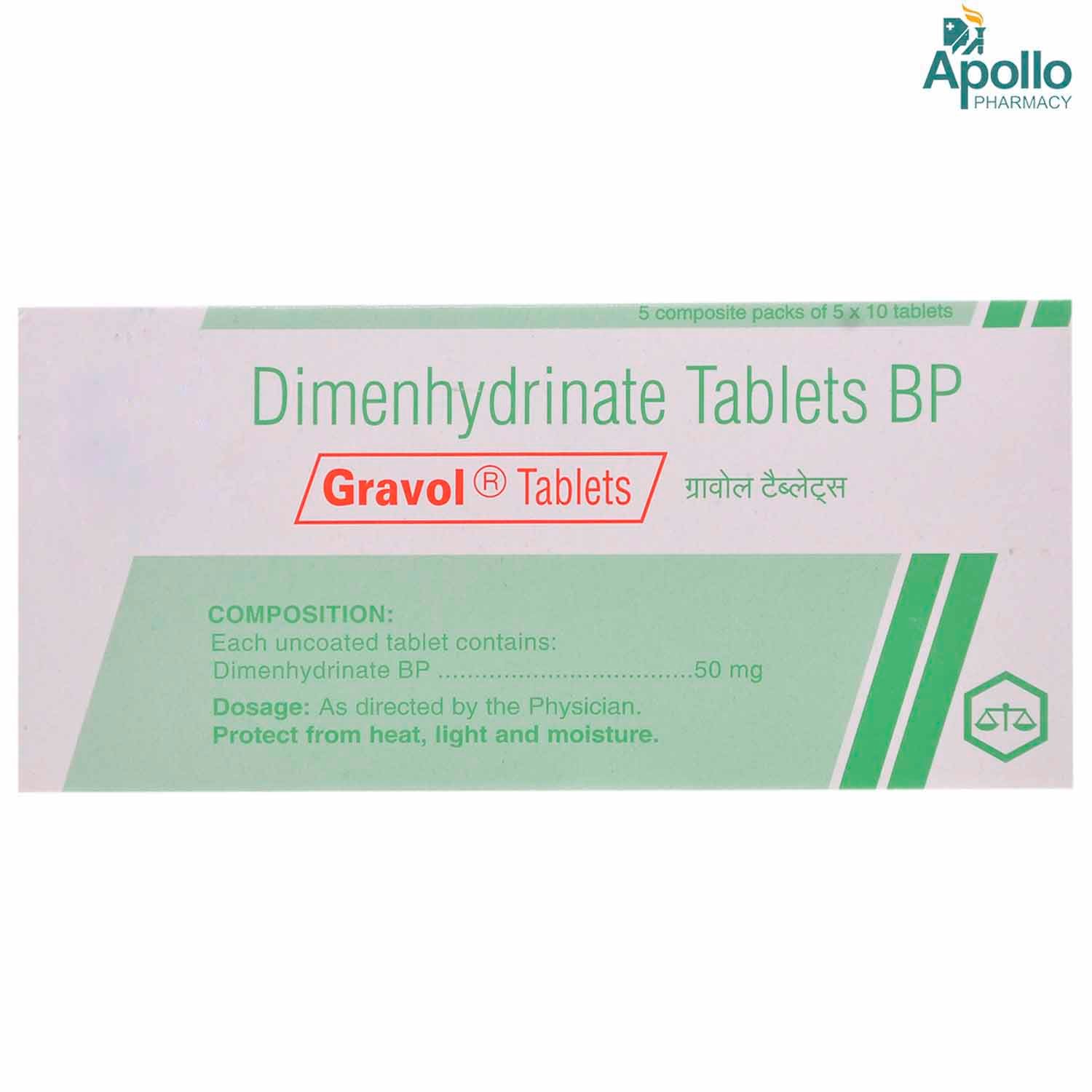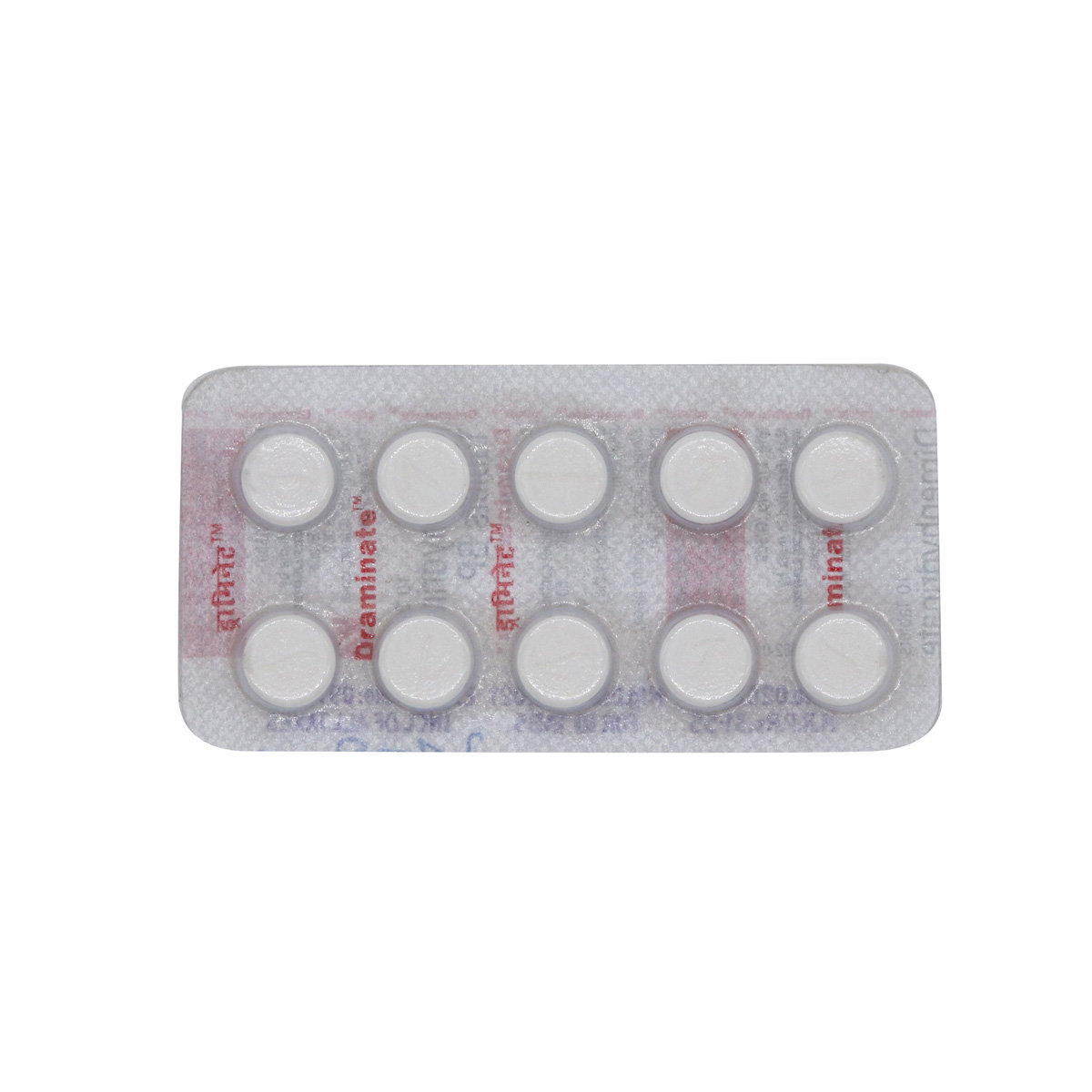Dimenhydrinate
About Dimenhydrinate
Dimenhydrinate belongs to the class of medications called ‘antihistamines’ used to prevent and treat nausea (feeling sick), vomiting (being sick), and dizziness caused by motion sickness. Besides this, it also used to treat nausea and vomiting associated with radiation sickness, surgery, drug-induced, Meniere disease (feelings of spinning and inner ear problems). Motion sickness is an illness caused by motion during travel characterized by nausea and vomiting.
Dimenhydrinate contains ‘Dimenhydrinate’, which acts as an antihistamine and anticholinergic. It blocks the muscarinic cholinergic receptor (M1) in the brain, thereby producing a calming and anti-nausea effect. It is also used to treat symptoms of other motion and balance problems, such as feelings of spinning and inner ear problems (Meniere's disease).
Dimenhydrinate may cause side effects like dry mouth, blurred vision, drowsiness, dizziness, headache, tiredness, disorientation, tinnitus, dry mouth, palpitation, and low blood pressure (hypotension). Most of these side effects do not require medical attention and resolve gradually over time. However, seek medical attention immediately if these side effects persist or worsen.
Notify your doctor if you have breathing problems (asthma, emphysema), high pressure in the eye (glaucoma), seizures (fits), liver, kidney, heart problems, chronic obstructive pulmonary disease (COPD) or sleep apnea (sleeping disorder). Consult your doctor if you are pregnant or breastfeeding. Dimenhydrinate should not be given to children below 2 years as the safety and effectiveness were not established. Dimenhydrinate may cause dizziness, so drive or operate heavy machinery only if you are alert.
Uses of Dimenhydrinate
Medicinal Benefits
Dimenhydrinate contains ‘Dimenhydrinate’, which belongs to the class of ‘antihistamine’. Dimenhydrinate also has anticholinergic properties. It works by blocking the muscarinic cholinergic receptor (M1) in the brain, thereby, preventing nausea and vomiting. Dimenhydrinate used to prevent nausea and vomiting associated with conditions like travel or motion sickness, radiation sickness, postoperative, drug-induced, Meniere disease (feeling of spinning and inner ear problems) in adults.
Directions for Use
Storage
Side Effects of Dimenhydrinate
- Dry mouth
- Blurred vision
- Drowsiness
- Dizziness
- Headache
- Tiredness
Drug Warnings
Do not take Dimenhydrinate if you are allergic to any of its contents. Before taking Dimenhydrinate, please tell your doctor if you are using any antidepressants. Dimenhydrinate is not intended for prolonged use unless prescribed by a physician. Inform your doctor if you are pregnant or breastfeeding. Antihistamines overdosage may cause hallucinations, convulsions, or death, especially in infants and children; it also produces excitation in younger children. So, dose adjustments may be necessary if prescribed to children. Dimenhydrinate should not be given to children below 2 years of age and patients who are unconscious or have severe drowsiness, dizziness, or headache. Inform your doctor if you have difficulty breathing, asthma or bronchitis (lung problems), epilepsy (fits), serious heart problems, liver or kidney problems, a stomach blockage, hearing problems, or increased pressure in the eye (glaucoma).
Drug Interactions
Drug-drug interactions: Dimenhydrinate may interact with other antihistamines (loratadine, diphenhydramine, cetirizine), pain reliever (codeine, morphine, hydrocodone), antidepressants (amitriptyline, imipramine), sedatives (diazepam and zolpidem), antibiotics (gentamicin)
Drug-food interactions: Avoid consuming alcohol when taking Dimenhydrinate, as it may cause excessive sleepiness or drowsiness.
Drug-disease interactions: Dimenhydrinate should be used with caution in patients with respiratory diseases (asthma), liver or kidney problems, serious heart problems, sleep disorders, seizures, and hearing problems.
Drug-Drug Interactions Checker List:
Safety Advice

Alcohol
cautionAvoid alcohol consumption as it may cause increased drowsiness.

Pregnancy
cautionDimenhydrinate is a pregnancy category B drug, so its use in pregnant women is safe if prescribed by a doctor.

Breast Feeding
cautionIt is not known whether Dimenhydrinate passes into breast milk or harms a nursing baby. Please consult your doctor.

Driving
cautionDimenhydrinate may cause drowsiness and dizziness. So, avoid driving or operating heavy machinery while using Dimenhydrinate.

Liver
cautionDimenhydrinate should be used with caution in patients with liver diseases. Your doctor will weigh the benefits and any potential risks before prescribing Dimenhydrinate. Please consult your doctor.

Kidney
cautionDimenhydrinate should be used with caution in patients with kidney diseases. Your doctor will weigh the benefits and any potential risks before prescribing Dimenhydrinate. Please consult your doctor.

Children
cautionDimenhydrinate is not recommended for use in children below 2 years of age. For children above 2 years of age, dose adjustments may be necessary if prescribed.
Habit Forming
Diet & Lifestyle Advise
- Avoid spicy, greasy, and acidic foods before travelling; it may increase the feeling of sickness.
- Opt for cereals, apples, bananas, or bread.
- Breathe the fresh air, if possible, by opening the window.
- In many cases, a full stomach and excessive heat may worsen the symptoms of motion sickness, space out your meals and eat light.
- Position yourself where motion is least, like in the front seat of a car, centre of a boat or ship.
- Avoid alcohol 24 hours before travel and during travel.
Patients Concern
Disease/Condition Glossary
Motion sickness: It is an illness caused by motion during travel. It usually occurs when you are traveling by car, boat, plane, or train. Your body's sensory organs send mixed messages to your brain, causing dizziness, lightheadedness, or nausea and vomiting. The illness usually goes away when the motion stops. Symptoms include nausea, vomiting, dizziness, and tiredness.
FAQs
Yes, the use of Dimenhydrinate can cause dry mouth. If you feel excessively thirsty, increase fluid intake, and avoid spicy and salty food.
Dimenhydrinate is an anti-sickness medicine that takes about 30-60 minutes to show its action.
Dimenhydrinate is usually recommended for short-term use. Do not take longer than prescribed unless advised by your doctor.







